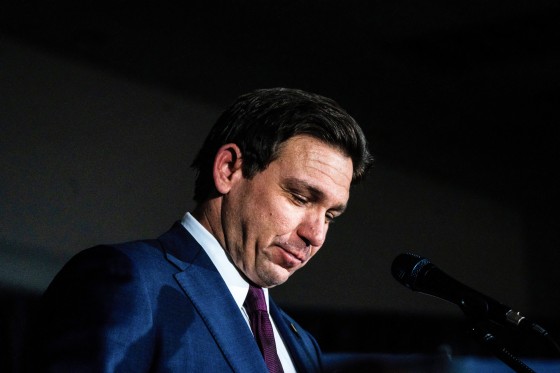Two years has been a political eternity for Florida Gov. Ron DeSantis.
In 2022, when DeSantis was at the peak of his political powers and openly flirting with running for president, he used his sway to start remaking local school boards into much more conservative-leaning bodies. During that year's midterm elections, when DeSantis won re-election by a historic near 20-points, he backed 30 school board candidates, and only five lost.
Now, DeSantis is on the heels of a failed bid for the GOP presidential nomination that tarnished his reputation nationally, and the power of his endorsement in Florida appears to be waning. DeSantis backed 23 school board candidates in Tuesday’s primaries, and nearly half of them did not win, while six others were forced into runoffs.
DeSantis remains a popular governor in an increasingly red-leaning state that just saw Republicans take a more than 1 million voter registration advantage. But the primary losses are among the biggest in-state political headwinds he has faced in years.
DeSantis-backed candidates also suffered losses in other races, while he notched victories in some state legislative contests. But the school board elections provide a snapshot of how the political dynamic has shifted for him.
DeSantis is the first governor in state history to become so heavily involved in what have historically been considered sleepy and technically nonpartisan races.
DeSantis and his team have framed the primary night losses as uphill battles from the start, noting that some of the candidates he backed were running in Democratic-leaning areas.
“You’re going into some of these areas that Republicans have never been competitive in, like the heart of Tampa,” DeSantis told reporters Wednesday at a news conference. “You need to field candidates and run them all the way across the board.”
Some of the race were unquestionably in Democratic-leaning counties, but DeSantis-backed candidates also lost in traditional conservative strongholds like Indian River, Sarasota and Flagler counties, all of which Donald Trump carried easily in 2020.
DeSantis pointed to wins in Duval County, where the city of Jacksonville is, that helped flip that school board for candidates more aligned with Republicans on education policy, but it was a rare clear-cut win for a governor who in recent years has become accustomed to stacking up victories in his state.
“I think it’s pretty clear that we are moving back toward a scenario where candidates once again matter,” said a longtime Florida Republican operative and DeSantis supporter, who was granted anonymity to speak candidly. “In 2018 a Trump endorsement was inflatable. In 2022, DeSantis could have handpicked anyone in Florida he wanted. In 2024, you need more than an endorsement to win.”
The operative said that the residue of Tuesday's vote may be felt in 2026, when there is expected to be a crowded field of Republicans running to replace DeSantis, who will be ineligible to run again because of term limits. Those contenders will likely be jockeying for an endorsement from DeSantis or Trump, who also saw some of his endorsed candidates lose Tuesday night.
Those endorsements in recent years would have been seen as hugely important for any Republican candidate, but they may be becoming less signifiant.
“The biggest losers in this scenario are the ones who convinced themselves in 2026 there was some magic Trump endorsement that was going to make them governor,” the operative added.

